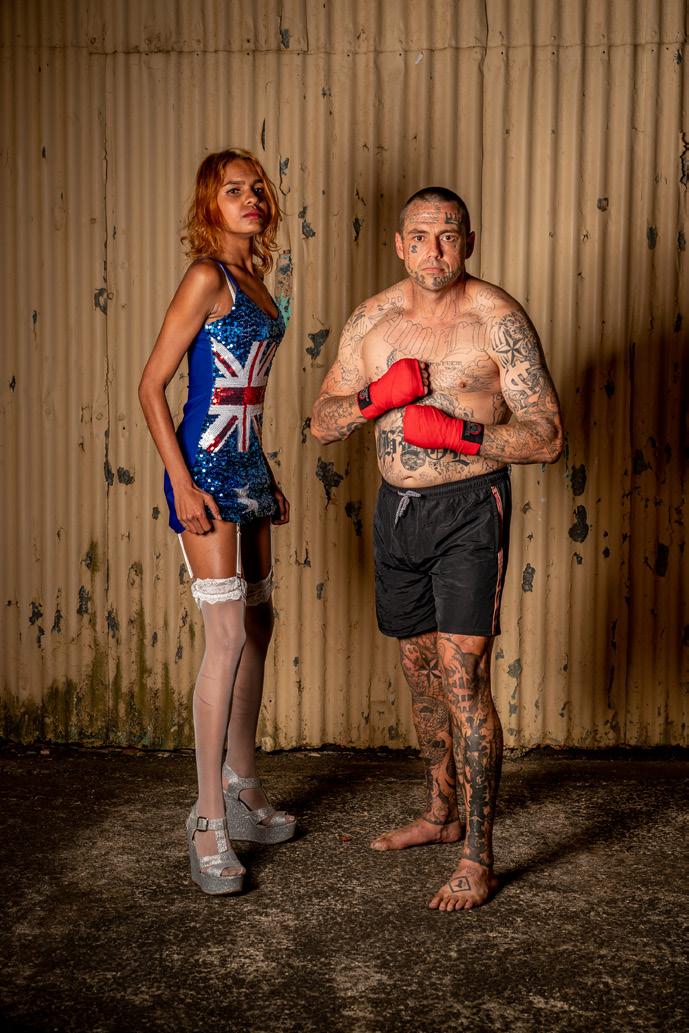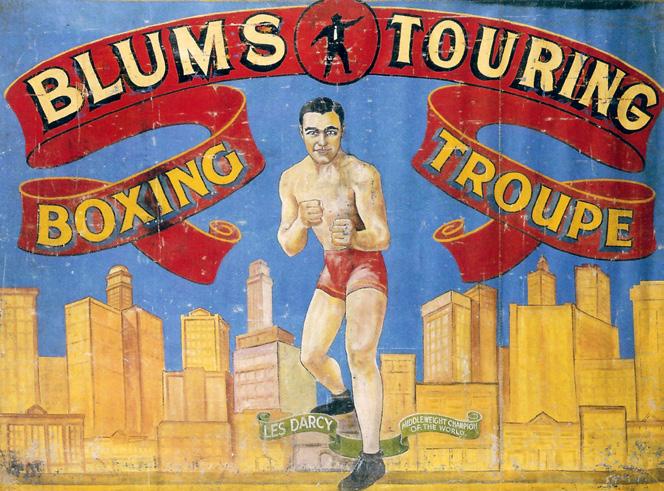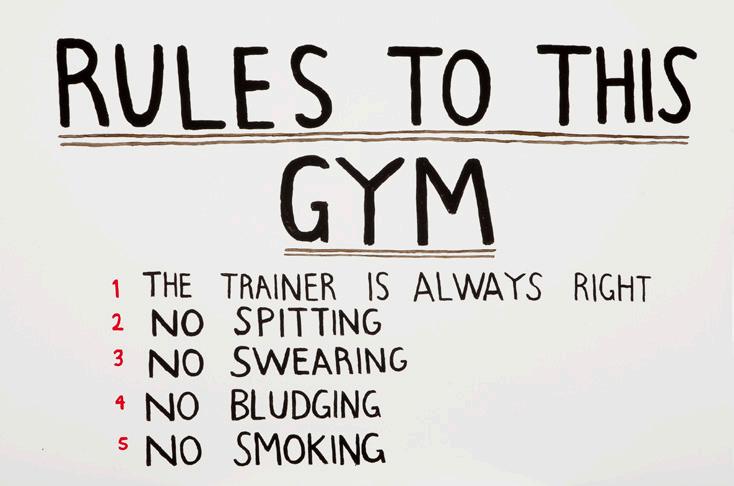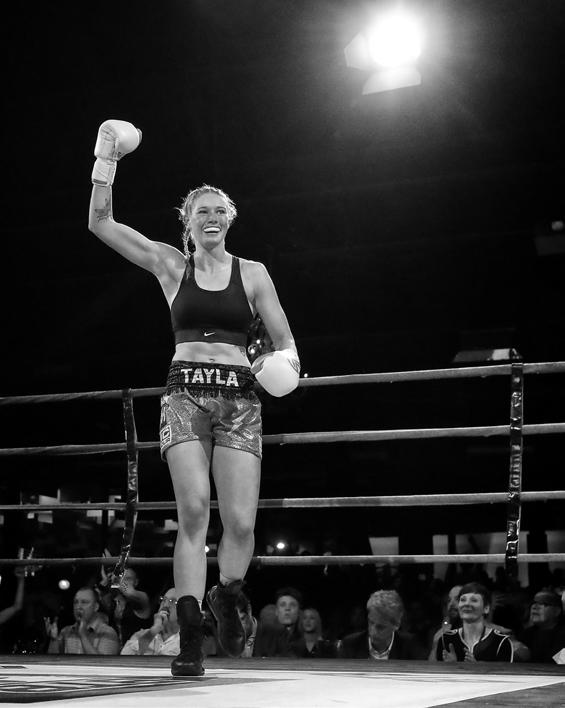
6 minute read
Feature Story
Gallery Director Gerry Bobsien takes us into the boxing tent to explore the themes and artwork featured in Shadow Boxer, MRAG’s major exhibition for 2021.
Cultural Advice: Aboriginal and Torres Strait Islander people should be aware that this article contains the names of deceased persons.
Last year MRAG acquired several works by Wiradjuri artist Karla Dickens. Now part of the Collection, these works look at the celebration and exploitation of Aboriginal tent boxers who toured regional Australia in the boxing troupes of the 1920s–1950s. These acquisitions led to a spirited conversation about boxing and art with my colleague Lisa Slade, who is Assistant Director Artistic Programs at the Art Gallery of South Australia.
From here, many threads converged. I started thinking about the act of making art, the repetitive and disciplined practice of many artists, along with all the boxing films I’d seen (I have a thing for sports drama), the artists now working with boxing as its subject and, indeed, Maitland’s own boxing legacy and MRAG’s stewardship of the Les Darcy collection.
There is a lonely roadside memorial on Chichester Road, Dungog that marks the life and death of Dunghetti man Dave Sands. In 1952, a truck rolled off the verge and ended the life of this extraordinary athlete and man of great character at the age of 26.
Both serve as a reminder of the loss of a sporting legend considered one of Australia’s greatest boxers.
Immersed in a family of boxing legends, Dave Sands – a middleweight boxing champion – fought with his brothers Clement, Percival, George, Alfred and Russell, who followed after their father George Ritchie and grandfather Bailey Russell. This was a time when Aboriginal participation in sport provided alternative employment and a proxy for citizenry previously denied. Between them, the brothers contested 494 official fights with 301 wins, and toured regional Australia with the boxing troupes made famous by the likes of Jimmy Sharman.
Artists Karla Dickens and Nigel Milsom shine a light on the men who fought in tents like this during the early 20th century.
In June 2020, MRAG acquired works by Dickens that were exhibited in the Art Gallery of New South Wales for NIRIN, the 22nd Biennale of Sydney. These works, Pound-for-Pound #3 (see front cover) and Ms. Ready and Mr. Willing, will be shown in Shadow Boxer alongside other work in the Collection, including the images and personal memorabilia of Maitland’s Les Darcy who, in 1915, captured the hearts of the nation, becoming a boxing world champion and national hero.

Unknown artist, Blums Touring Boxing Troupe, 1950s, boxing tent wall, mixed media, 175 x 233cm. Purchased by Maitland Regional Art Gallery, 2004.
In an interview for Ocula Magazine, Dickens speaks about the two characters represented in Ms. Ready and Mr. Willing, and in her mixed-media installation A Dickensian Circus in the vestibule of the Art Gallery of New South Wales. The installation included a powerful sculptural sentry of boxing gloves, Pound-for-Pound #3 amongst them, found objects and two large-scale banners featuring the two figures in MRAG’s recent acquisition.

Karla Dickens, Ms. Ready and Mr. Willing, 2019, digital photograph, 180 x 120cm. Purchased by Maitland Regional Art Gallery, 2020.
Dickens said Ms. Ready represents the ‘leg girls’ who would also tour with the boxing troupes, standing tall and defiant before the colonial backdrop of the Art Gallery of New South Wales entrance vestibule. Mr. Ready stands powerful and unwavering. For Dickens, both characters reflect resilience and survival. (i)

Richard Lewer, Northside Boxing Rules, enamel on steel, 100 x 70cm
Two artists featured in the exhibition who combine the sport with their practice are Victorians Fiona McMonagle and Richard Lewer. For these artists, boxing is both a subject and a way of life. Lewer begins his day in the studio and ends it at the Northside Boxing Gym in Preston, Melbourne, where he is a boxing trainer. Fiona McMonagle’s watercolour animation of female boxers, The Ring, reflects on her own personal connection to the physicality of boxing. It is an unlikely subject for watercolour, but its treatment lends itself to the mutable colours and fleshiness of bruised skin.
David Matthews is a London-based writer who has lived and breathed the life of a boxer after witnessing a fight in 1998 that challenged his complicity and role as reporter/observer in the spectacle. He writes in his book Looking for a Fight:
He continues:
"In the cauldron of emotions that is the boxing arena, I somehow accepted that racism, bigotry, intimidation and violence came with the territory.
I felt mildly ashamed that I could be so hypocritical about my feelings. I also felt disturbed by the pleasure I derived from watching men fight and my inability to reconcile this pleasure with whatever principles I held as a human being. I concluded that if I was not part of the solution, I was part of the problem. Whether inside or outside the prize ring, boxing exploited people like me – working class blacks, white-trash, the rednecks, the browned off." (ii)
The fight Matthews witnessed was between Mehrud Takalobishi, a “twenty-two-year-old light middleweight prospect hailing from Tehran via Margate” and Jawad Khaliq, a “sinewy Pakastani with the physique of a skinned rabbit”. He decided then to step inside the ring himself and embark on a two-year journey that formed the basis for his book. David has much to say about boxing and all its motivations.
David will be in discussion with myself and other artists through our digital program and we look forward to sharing these discussions with you.
Also in the exhibition, poet Keri Glastonbury responds to the literary fascination of boxing and its usual blokey terrain through poetry, and a series of dramatic ringside photographs taken by AFL chief photographer Michael Willson celebrates the athletic power of Australian boxer and AFL women’s league star Tayla Harris.
While fighting professionally, Bianca is passionate about community and cultural identity, using her sport as a platform to promote change.
In December 2020, MRAG was awarded the NSW Museums and Galleries Dobell Exhibition Grant with significant funding to enhance the education and public programs accompanying the exhibition, to showcase new and existing works in the Collection and to present an intriguing and entertaining show. We hope you enjoy the breadth of ideas presented by all of the participating artists in Shadow Boxer.
Words: Gerry Bobsien

Michael Willson, Tayla Harris, 2019, photograph.
Shadow Boxer is showing at MRAG from 29 May – 8 August 2021.
Check the MRAG website for updates about the public events program accompanying the exhibition.
NOTES
i. Karla Dickens, ‘the more you know the rules, the more fun it is to break them’, In Conversation with Emma-Kate Wilson, Ocula Magazine, Sydney, 12 June 2020
ii. David Matthews, Looking for a Fight: How a writer took on the boxing world - from the inside, Headline, 2005










